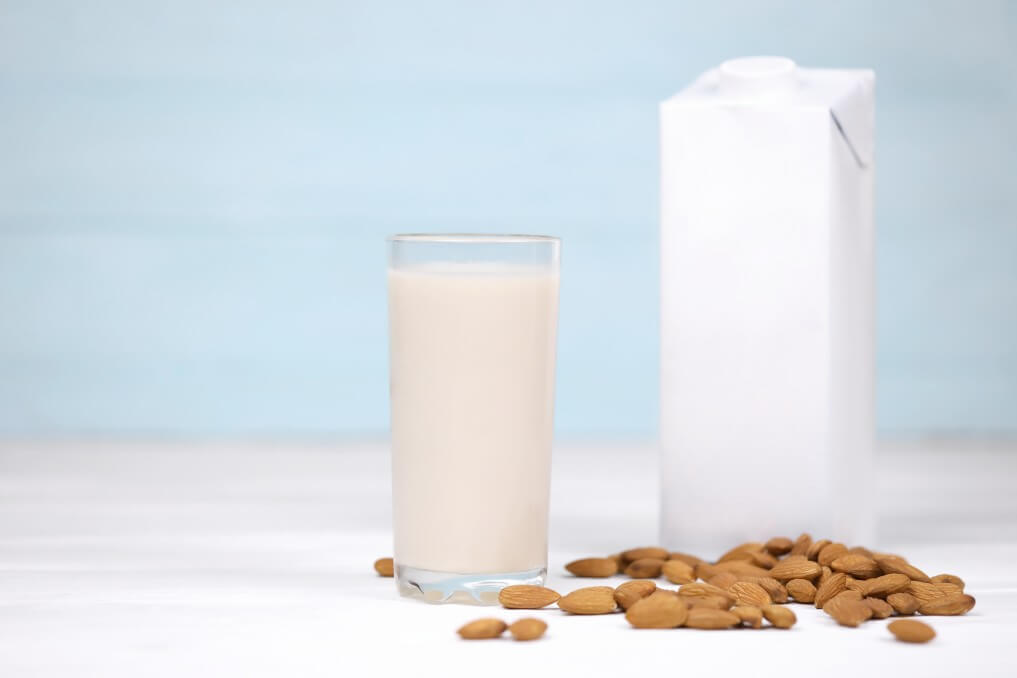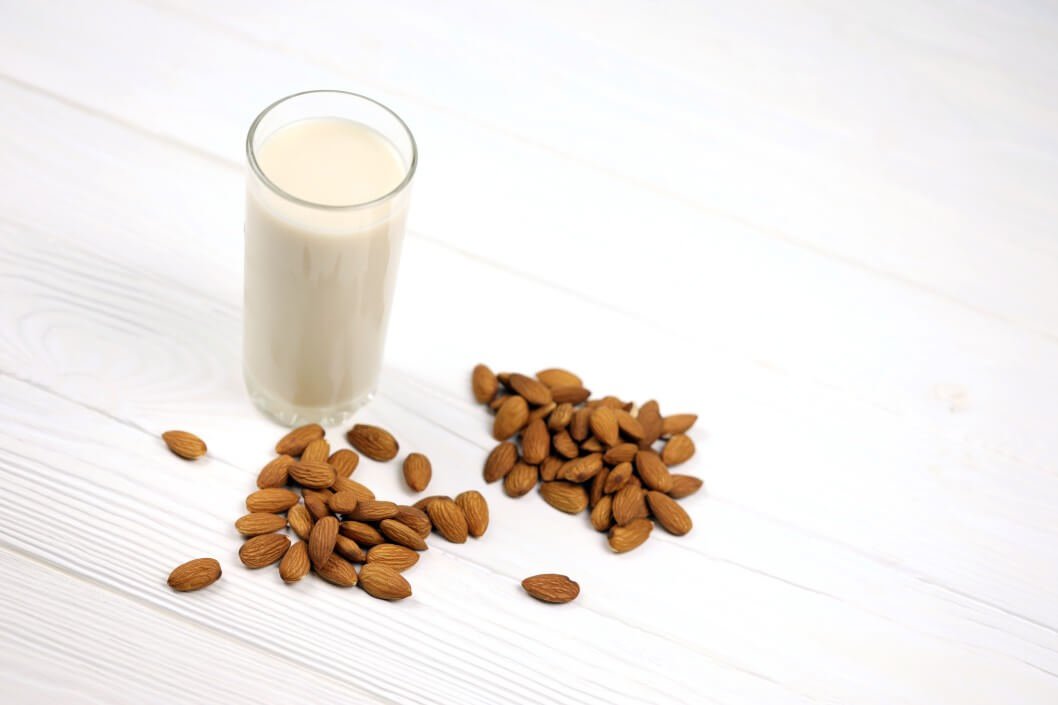Almond Milk vs. Cow Milk
Almond milk is vegan-friendly, low calorie, and lactose-free. But cow's milk is packed with vitamins and nutrients. Which is better?
Almond milk is vegan-friendly, low calorie, and lactose-free. But cow's milk is packed with vitamins and nutrients. Which is better?
As the world embraces a more sustainable and ethical future, many turn from animal-based products to their 'green' alternatives.
Cow's milk is increasing in the spotlight for both health implications as well as taking a toll on our dwindling resources on an overcrowded earth. But you may wonder how almond milk compares to cow's milk?
Almond milk is a low fat and lower-calorie alternative to cow's milk that contains 100% of our daily requirement for essential vitamin E. Unsweetened almond milk may be fortified without the hazards of lactose intolerance or milk allergies. Cow's milk is nutrient-rich and contains higher levels of protein.
If you want to change to a cruelty-free dairy milk alternative, almond milk is an excellent choice.
Although it is low in protein, certain additions to your diet may easily supplement the lack. However, cow's milk is still a nutritional power pack, despite its many failings.
Here's all you need to know when comparing the pros and cons of old-fashioned cow's milk and the new trend of almond milk substitutes.
Lets start by looking at the nutrition facts for both cow milk and almond milk.
We broke down the most common variations of both types of milk. For almond, we have plain (unsweetened) and sweetened. We typically recommend sticking with unsweetened though.
For cow's milk, we have whole, low fat, and skim milk.
1 cup | Calories | protein | sugar | fat | CARBS | Calcium |
|---|---|---|---|---|---|---|
Almond milk (plain) | 39 | 1g | 2g | 3g | 3.5g | 24% DV |
almond Milk (Sweetened) | 60 | 1g | 12g | 2.5g | 16g | 24% DV |
Skim Milk | 84 | 8.5g | 11g | 0.2g | 12g | 25% DV |
Low Fat Milk | 106 | 8g | 12.5g | 1.5g | 13g | 24% DV |
Whole Milk | 149 | 8.5g | 12g | 4.5g | 11.5g | 24% DV |
As you can see, almond milk has a significantly lower calorie count, primarily because it contains less sugar and fat.
However, cow's milk has the upper hand when it comes to protein, which can be a bonus if you're trying to put on muscle. The lower fat alternatives (skim and low fat) will save you some calories, but you'll sacrifice taste and some essential nutrients.
The nutrition facts alone might help you make a decision, but there's a lot more to unpack.
Let's dive deeper into the pros and cons of both types of milk.

Here are the advantages of drinking cow milk.
Milk is arguably one of the most nutritious drinks on earth as it contains all the requirements to grow a healthy newborn calf with a rapid growth cycle.
Beyond the high protein content, which is common knowledge, modern research has revealed that cow's milk contains over 2,000 chemical compounds, including almost 200 that scientists discovered they did not know about before.
Compared to plant-based milk, cows are naturally vitamin-rich without the necessary addition of vitamins essential for human health. Cow's milk has a broad range of vitamins that include:
While skim milk and low fat milk may contain lower calories, if you want the full nutritional profile of cow's milk, opt for full fat milk instead.
Here are the disadvantages of drinking cow milk.
Milk also contains cholesterol due to its saturated fat content, which can lead to coronary disease.
In fact, saturated fats make up 70% of whole milk's fatty acid content. The connection between cardiovascular disease and cow's milk is unclear, but this high saturated fat content is known to increase both good and bad cholesterol in the human body.
A clinical study conducted on several groups of men and women found that when dairy fat is replaced with polyunsaturated and vegetable oils, there is a 24% lower risk of cardiovascular disease.
In a clinical study conducted on 21,660 male test subjects, higher milk intake is associated with increased chances of prostate cancer.
Men with an intake higher than 2.5 servings of dairy foods showed a 12% increase in their risks of this cancer, including early-stage prostate cancer and fatal advanced prostate cancer in whole milk consumers.
Milk also contains cholesterol due to its saturated fat content, which can lead to coronary disease.
In fact, saturated fats make up 70% of whole milk's fatty acid content. Some studies correlate the incidence of breast cancer in women with those who have high diary dietary intake.
If you're going to consume cow milk (or any dairy product) moderation is key. Check with your physician if your diet is high in dairy milk to ensure you're not at risk of any health conditions.
Although many people lump milk intolerance and milk allergies under the same banner, they are two distinct reactions to consuming milk and milk-based products.
Here's the difference.
A milk allergy is a reaction to the whey proteins found in milk called the alpha-lactoglobulin and beta-lactoglobulin or a reaction to the caseins contained in cow's milk.
More commonly found in children, the effects of this allergy may include symptoms such as:
When a person is lactose intolerant, they cannot fully digest lactose, the main carbohydrate found in milk. Ideally, the human body should be able to break lactose down into glucose and galactose in their digestive tracts.
However, those that suffer from this condition lose the ability to break down lactose after childhood. Because the lactose is not adequately broken down, the lactose moves into the colon, where the gut bacteria start to ferment the leftover lactose.
This fermentation process creates a gas build-up and produces short-chain fatty acids that may lead to symptoms such as:
Lactose intolerance is relatively prevalent and not a rare condition by any means. According to Healthline, almost two-thirds of the world's population suffers from some degree of lactose intolerance.
A diet high in bovine milk has been directly linked with skin conditions such as acne. Acne tales the form of unsightly pipes typically found on the face, chest, and back.
This condition is partly due to high milk consumption enhancing the production of growth factor-1 (IGF-1), which is an insulin-like hormone thought to be behind the appearance of acne.

Here are the benefits of almond milk.
You can also watch our Almond Milk 101 video for more info!
A cup of almond milk offers 100% of an average person's daily requirements in Vitamin E.
Vitamin E has a variety of essential roles in the healthy functioning of the human body. These roles include:
Along with the Vitamin E benefits, almond milk comes packed with other healthy vitamins such as:
With some sources suggesting that 75% of the world's population suffers from lactose intolerance, almond milk is an excellent substitute for those whose bodies can not tolerate the lactose in milk.
With much modern almond milk being fortified with added vitamins, they can provide similar benefits to cow milk without the symptoms of lactose intolerance.
Cow's milk contains substantially more calories than almond milk, as seen in the table comparison at the start of this article.
Although almonds themselves are high in calories and fat in their raw form, the process of creating almond milk lowers the caloric output.
The lower comparative sugar and fat in almond milk also suits those who seek weight loss.
Plain unsweetened almond milk has six times less sugar than whole cow's milk, making it a far healthier alternative for those watching their waistlines.
PETA is a firm supporter of banning the inhumane practice of commercial dairy farms.
The cows suffer terribly in confinement and have their young taken from them at only one day old to significant distress and emotional harm.
The stress of their cruel and unnatural environment and treatment decreases an average milk cow's life expectancy from 20 to only 4-5 years old.
This cruelty is not even to mention the dairy industry's impact on the environment at large.
The incredible amount of waste and space the dairy industry takes from agricultural land causes countless environmental effects.
These effects include

While almond milk is great, it's not perfect for everyone. Here are the disadvantages of almond milk.
Almond milk may contain potentially harmful additives such as seaweed-based carrageenan.
This food additive, usually used as a thickener, has been linked to ulcers, colon damage, and cancer.
A lot of almond milk also contains gums like guar and gellan gum that are used as emulsifiers.
These gums improve the consistency of almond milk to give it its smooth, creamy, milk-like texture.
While the general consensus is the amount of gums companies put in almond milk is safe to consume, there are a few studies that have shown it can impact your digestive system.
While gums are generally considered safe to consume, we suggest getting almond milk that doesn't contain carrageenan and gellan gums when possible.
Also, sweetened almond milk tastes great, but brings all the hazards of sugar consumption, such as cavities—weight gain and diabetes.
Although it offers considerable health benefits, almond milk has only 1g of protein per cup, while cow's milk provides at least 8g of this valuable component.
Proteins are complex molecules that play a variety of roles in human health.
They are considered the basic building blocks of tissue and muscle and regulate the human body's tissue and organs.
Protein is made up of long chains of amino acids, which vary in function according to their sequence in these amino acid chains.
The role of protein is vital in children's growth and development.
Other roles of protein in the body include:
It's worth noting though, that you can combine almond milk with protein powder to get more protein for fewer calories than cow's milk.
Almond milk may cause allergies in people with a sensitivity to tree nuts. When someone is allergic to nuts, their body reacts by creating an immune response to counteract what the body identifies as a harmful substance.
The body releases chemicals such as histamine, which results in a variety of symptoms of increasing severity. These symptoms include:
Almond milk has multiple health benefits when fortified with essential vitamins. The product comes close to the nutritional advantages of cow's milk without many of the potential health hazards.
But ultimately, Almond milk comes with the secure knowledge that the product you drink does not cause an animal suffering and reduces the strain on our depleted planet.